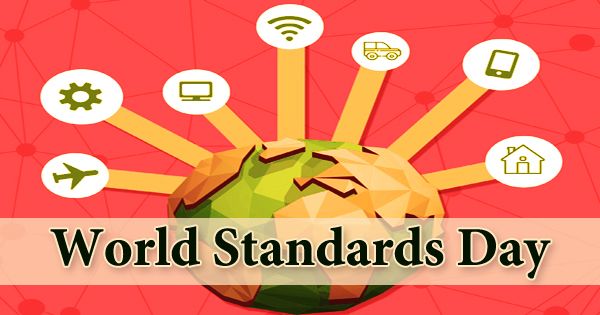Every year on the 14th of October, members of the IEC (International Electrotechnical Commission), ISO (International Organization for Standardization), and ITU (International Telecommunication Union) observe “World Standards Day”, also known as “International Standards Day.” The aim of the day is to raise consumer, regulatory, and industry consciousness of the importance of standardization to the global economy. The day recognizes the thousands of experts who work with organizations including the American Society of Mechanical Engineers (ASME), the International Ethics Standards Board for Accountants (IESBA), the Institute of Electrical and Electronics Engineers (IEEE), and the Internet Engineering Task Force (IETF) to establish voluntary standards. This is a way of honoring the collaborative efforts of many professionals from around the world who create professional agreements that are published as International Standards. The 14th of October was chosen to commemorate the first meeting of delegates from 25 countries in London in 1946 when they voted to form an international organization aimed at promoting standardization. Despite the fact that ISO was established a year later, the first World Standards Day was not observed until 1970. Technical barriers to international trade can be overcome with the aid of international standards. Following the Industrial Revolution, the implementation of international standards became a crucial problem. Though the first international standards organization was established in 1906, the ISO was officially established in the mid-twentieth century, and it was then that the most robust extension of standards began. National bodies choose a variety of events to celebrate the date all over the world.
The stakeholders selected a number of events to mark the day around the world. Scientists, mathematicians, and others from the field of standardization were present at the events. The aim of World Standards Day is to raise awareness among industry, customers, regulators, and the government about the importance of standardization to the international economy. By celebrating World Standards Day, member countries demonstrate their commitment to transforming their cities into smart cities that meet international standards. On October 23, 2014, the United States arranged a U.S. Celebration of World Standards Day. The Standards Council of Canada (SCC), Canada’s national accreditation body, joins the international community in commemorating World Standards Day by observing the day near the international observance dates. The theme for this year’s World Standards Day reveals the realities of today’s healthcare and the patients’ and caregivers’ future needs. We live in a world that is rapidly globalizing, with open markets for exporting and importing goods from all over the world. Standardization is a crucial method for making trade easier. It aids us in overcoming the technical difficulties we can face in achieving our objectives. World Standards Day was established in 1970 and is now celebrated all over the world. A coordination committee plans and manages the United States’ programs every year. The committee is made up of delegates and officials from the standards and conformity evaluation societies. The world is experiencing rapid urbanization and globalization, as well as a growing global population. We are still dealing with climate change problems that need immediate solutions. To address all of these issues, standardization will play a critical role in the development of new opportunities and solutions to technological problems. All aspects of energy conservation, water conservation, and air quality are covered by the standards. They develop standardized measurement protocols and methods. Their widespread use decreases the environmental effect of industrial production and processes, promotes resource utilization, and enhances energy efficiency. Standards essentially help to ensure that all products and services are of the same quality and meet the same standards, regardless of where they are manufactured. Standards, which are based on a global agreement, assist countries in achieving a variety of goals, including establishing a common technological basis for manufacturing products, facilities, or systems anywhere, as well as confirming protection and efficiency. In the end, everybody profits from a skilled and resourceful industry, including customers, testing laboratories, governments, suppliers, and all other market participants.
















